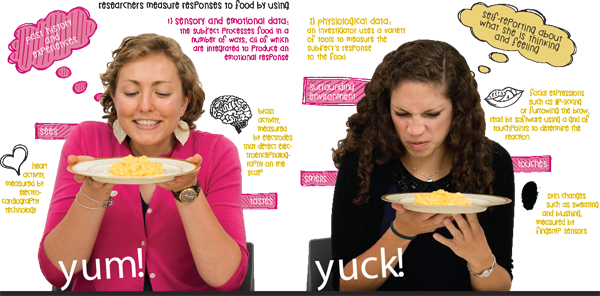HOW TECH TICKS

The appreciation of food is a universal trait.
Food's role in social gatherings, bonding experiences, and survival guarantees that what we eat occupies a central place in the human experience. Understanding how we react, positively or negatively, to different kinds of food is key to fields from marketing to public safety.
Virginia Tech researchers are using tools from a multitude of disciplines to better understand how and why people react emotionally to food. Susan Duncan, a professor in the Department of Food Science and Technology in the College of Agriculture and Life Sciences, conducts studies that use both physiology and interviews to examine volunteers’ responses to food scenarios.
Duncan has a variety of tools at her disposal that, though innovative, are still crude for interpreting the complex tangle of elements that factor into emotions and food. Past experiences, personal taste, and mood at the moment drastically affect the way we feel about food.
Take, for example, two individuals who are physically similar and come from the same socio-economic background. They may still respond in dramatically different ways to sushi because one first tasted it at a childhood birthday celebration, while the other got food-poisoning at a sushi restaurant around the same age.
"It's that black box of what's going on from a physiological standpoint, how the brain takes in all those signals—smell, how food looks, mixed with past experiences—all that gets jumbled together, and your body responds in a certain way," Duncan said.
She acknowledges that her work marks the launch of what could be a career obsession. Duncan hopes her research will help build the foundation for a broader field of study mapping the link between emotions and food.
Produced by University Relations